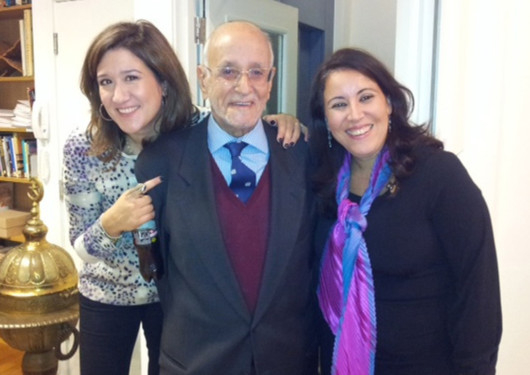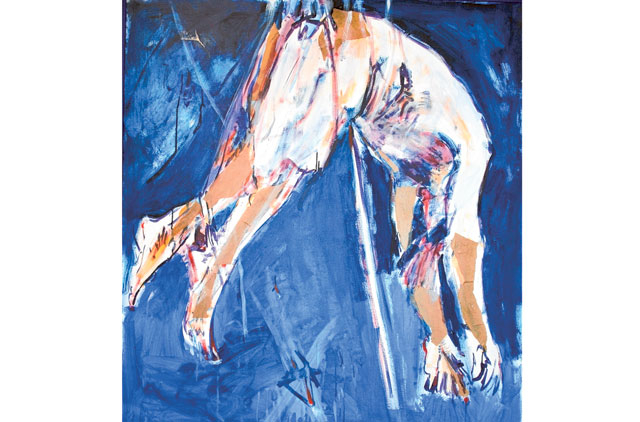
Libyan artist Hadia Gana is talking above the hubbub of a packed preview for the art exhibition, “The Libyan”, at the Arab British Centre in London. At our feet is her art installation and all around us people are desperately trying to avoid stepping on it in the crush of the small venue. Maybe that is exactly the right atmosphere to understand her work “Zarda”, or “Picnic”, which tells a story on many levels. As she explained, the word “zarda” is used to describe both a picnic and a chaotic or messy situation. When people go for a picnic, she said, they set down a carpet or rug and neatly arrange the teapot and hamper. Then all around this space or “territory”, debris is often left discarded.
Look closely and you will see a poignant image emerge from what at first appears to be an ordinary, everyday scene. For the message inscribed in the cleared space is a slogan that became synonymous with the Libyan revolution: “The blood of the martyrs will not disappear”. The ceramic bottles “discarded” around the picnic “carpet” bear the names and photographs of those who sacrificed their lives for the revolution. For Gana, based in Tripoli, it has been a painful experience to see how their sacrifice has to some extent been exploited by those who treat them almost like a brand or commodity to further their own agendas.
“For me this work represents something that hurt me at certain points”, she says. “These people are not goods or commodities — they are the children, brothers and sisters of people and we shouldn’t put labels on them or use them as brands.” Her work rings out like a bell — warning people to treat them with respect. In this setting, where the ceramic pieces bearing their names are so vulnerable to the crowd surging around them, you can see how easily damage can be done, even unwittingly.
Prior to the revolution, Gana was not able to make political statements through her art, although she did create pieces that commented on social issues using images that could be interpreted on a dual level.
Full of optimism about the future, she says, “We are a young population of just six million people, so everyone has a responsibility to make things better.”
“The Libyan” is presented by Noon Arts with the support of the British Council and Arab British Centre. Noon Arts was set up by two enterprising art enthusiasts, Najla’a Al Ageli and Nessrin Gebreel. It was Al Ageli who first had the inspiration to bring the work of Libyan artists to London and on to the international stage. This spring she was visiting the International Tripoli Fair, which has a focus on industry and manufacturing, when she came across a display of Libyan art. She got into a conversation with artist Muktar Al Shrief, who said that he hadn’t exhibited his art in Libya for 35 years because of the political situation. Inspired by what she saw, Al Ageli sought out artists, visiting Tripoli’s Dar Al Founon, or Art House, a traditional gathering place for creative people.
The works of eight artists in the mediums of painting, photography, sculpture, film and art installation were eventually selected for the exhibition. Al Ageli, whose parents are from Tripoli, was born in the United States, where her father was studying. Her childhood was spent between Libya and the US. She describes herself as a “nomad” having also lived in the United Kingdom, Italy and Spain. She is an architect by profession; she studied at the Architectural Association in London and worked in commercial and residential practices before setting up her own consultancy.
She has used her training to assist community projects in Egypt and southern Libya, introducing the idea of sustainable building techniques.
She is married with a child and moves between London and Tripoli, where her mother lives.
Her father left Libya, she says, because “he was thinking of our future and education as everything was becoming very bad”. She recalls how as child she would be “dragged” around art galleries across Europe. Her parents instilled in her from an early age an awareness of Libyan art, which was also displayed in their home.
Gebreel, co-founder of Noon Arts and joint organiser of the exhibition, shares with Al Ageli a passion for art and design. Gebreel, whose mother is a textile designer, was born in Benghazi but left as a child when her father, Dr A. O. Gebreel, OBE, working in Tripoli’s public health sector, became disillusioned with the political situation and moved to the US, where he took up a post at the Johns Hopkins Hospital in Baltimore, Maryland. He subsequently moved to the UK where he worked at the Liverpool School of Tropical Medicine (LSTM). Later, his work for the World Health Organisation in Afghanistan earned him an OBE.
Looking back over his long career, Dr Gebreel says: “It’s not easy to leave your country — it’s like leaving your mother. I was sad — but our hearts were still Libyan. I dreamt of revolution but the young generation achieved it.”
After completing a degree in Environmental Biology from Royal Holloway, University of London, in 1996, Nessrin Gebreel went to Afghanistan, where she worked as a research assistant on an LSTM programme focusing on the decentralisation of the health system. “I was completely overwhelmed with the beauty of the country and the people,” she recalls, but she was frustrated by the lack of funding to tackle the problems.
“When I came back I was determined to get into fundraising,” she says, and that led to a career with the Refugee Council and Amnesty International. Then a twist of fate set her on a totally unexpected path when she was asked by Amnesty to organise the global fundraising, marketing and press initiatives around the Eurythmics’ 1999 “Peacetour”. (All proceeds from the tour went to Amnesty International and Greenpeace). With 75 million record sales worldwide, the famous duo Annie Lennox and Dave Stewart were at the height of their fame, and it was a big challenge. But for Gebreel, who had just been in Afghanistan, this was nothing to get fazed by — and that level-headed attitude was noticed by Eurythmics manager Simon Fuller.
Fuller, a British entrepreneur, artist manager and television producer, first came to prominence through his management of the pop group, The Spice Girls. Famous names he now manages include David and Victoria Beckham, Lewis Hamilton and Lisa Marie Presley. He created the hugely popular talent show “American Idol”. His charitable work through his “Idol Gives Back” initiative raises millions for charities including Malaria No More and Save the Children.
Though Gebreel was initially unsure about stepping into the entertainment world, she did join Fuller’s senior management team and embarked on a decade of incredible experiences. She worked on “American Idol” and also managed David and Victoria Beckham for six years, including working with Victoria as she moved into the fashion industry and earned her reputation as a respected international designer.
“It was incredibly hard work but I had the most insane experiences — I laughed my way around the world!” she says.
Gebreel got married last year and now lives with her husband in Abu Dhabi. “The Libyan” is an expression of her continuing passion for human rights and her love of art. She does consultancy for organisations such as Nomad Two Worlds, which raises awareness of the rich cultural history of indigenous people worldwide.
For Gabreel and Al Ageli the exhibition is a platform to show the creative talent in Libya that has been suppressed for four decades. Al Ageli summed up the feeling when she related a comment made by the artist Mohammad Bin Lamin, who was imprisoned for several months during the February 17 Revolution at the infamous Abu Salim prison: “For 42 years there were six million people in Libya and one person talking — now there are six million people talking!”
The exhibition also features photographer Faten Baaba’s works. “Before the revolution you hardly saw any women taking pictures and I was often stopped by the security personnel asking why I was taking pictures and what I was going to use them for. So, it was a bit difficult and dangerous,” Baaba says. “Now I notice there are so many photographers around — it’s time to show the world that there is art in Libya!”
Filmmaker Naziha Arebi, who graduated with a masters in screen from Central Saint Martins College of Art last year, echoes that sentiment. She has rushed to the preview from the airport, where she had flown in from Doha, Qatar. Her short film, “Granny’s Flags”, shows the contribution of ordinary people in the revolution. “It’s a chance for people to find out what Libyan culture is all about,” she says. “We’ve got a really rich artistic history and this exhibition is an extension of that tradition.”
General National Congress Member, Halima A. Younis, visiting the UK with a delegation of Libyan MPs, is present at the preview. She has just returned from Belfast, Northern Ireland, where the delegation met with politicians and community leaders to hear how the people of Northern Ireland are coping with issues of reconciliation in the aftermath of 30 years of sectarian strife. She says Libyan art and culture is an important part of the new Libya.
Denise Marray is xxxxxxxxxxxxxxxxxxxxxxxxxx.
The exhibition will run at the Arab British Centre, 1 Gough Square, London EC4A 3DE, until March 10, 2013.




